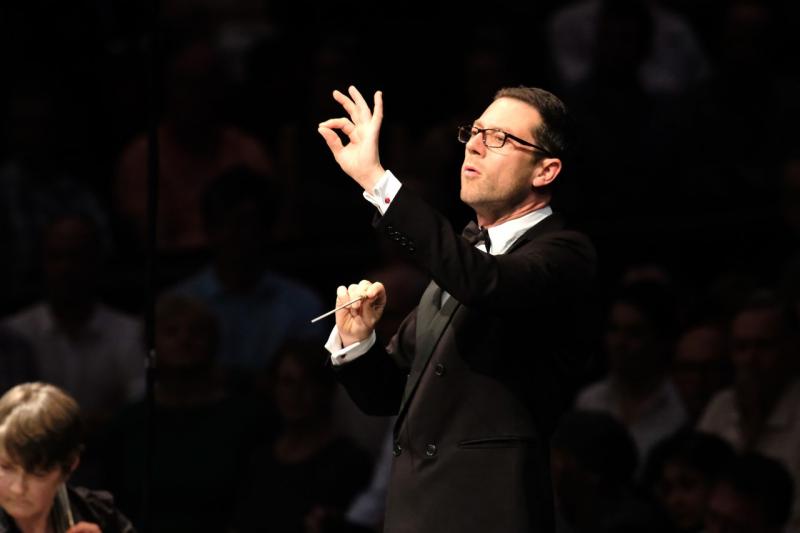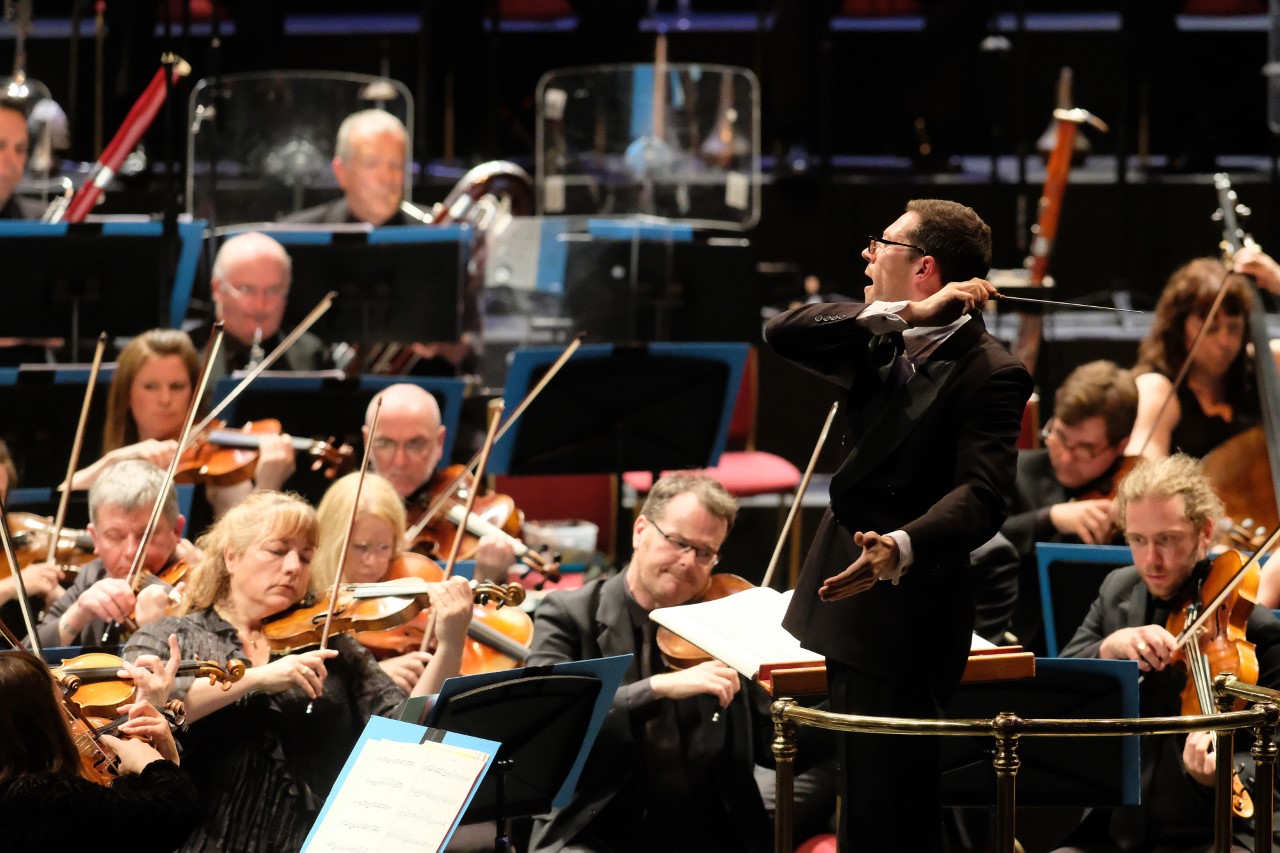Prom 14 review: BBCSSO, Wilson - illusion after illusion from musical conjurer | reviews, news & interviews
Prom 14 review: BBCSSO, Wilson - illusion after illusion from musical conjurer
Prom 14 review: BBCSSO, Wilson - illusion after illusion from musical conjurer
An evening of English music without a field or cowpat in sight

A packed Royal Albert Hall on a Tuesday night for a programme of 20th-century English music. Have the nation’s concert-goers come over all prematurely patriotic? Is Holst’s The Planets really that much of a draw? Or could the crowds have more to do with John Wilson – the straight-backed, schoolmasterly figure at the centre of the musical maelstrom?
If the Holst was the headliner here, then Vaughan Williams’ Ninth Symphony was a thoughtful opener, sneaked in under the cover of the former’s ticket-selling title. The Ninth isn’t an obviously ingratiating work, caught as it is between musical modes – sardonic, urban Shostakovich on the one hand, and lingering pastoral urges on the other. But the battle between these two forces is thrillingly dramatised, the composer pitting instrumental sections against one another in an extended conflict that only reaches a resolution in the symphony’s final moments.
Holst’s 'Planets' is a concerto for orchestra that uses every toy in the box
The BBC Scottish Symphony Orchestra have a forthright, bold sound, but they set it aside here for a wonderfully grungy start – pungent woodwind anticipating the smoky trio of wrong-side-of-the-tracks saxophones which set the tone for the symphony. Despite the sweetest blandishments of strings and flutes, there’s no luring this music back into its comfortable harmonic grooves, and every interval finds itself stretched or contracted into angular chromaticism.
Wilson may still be best known (in the context of the Proms, at least) for his film and musical theatre spectaculars, but what’s most striking about his approach to concert-hall repertoire is his restraint and precision. There’s razzle dazzle of quite a different kind to a performance capable of playing such a long game, of holding so much in reserve for so long. The second movement Andante was a sea – seemingly still, but rolling and roiling beneath the surface, while the mock-jaunty dance of a Scherzo nodded to the grotesque without ever getting costumey or camp – not a hermetically sealed episode, but another step towards the deciding conflict of the final Andante. Saving his reserves until the arrival of the shattering E major chord that tips the whole symphony on its axis, Wilson then spent all in a gambler’s flourish, claiming an ambiguous ending as an unequivocal victory. Holst’s Planets is a concerto for orchestra that uses every toy in the box and then some. In a space like the Royal Albert Hall and a festival like the Proms those are some pretty spectacular toys, including a behemoth of a Willis organ and the women of the CBSO Youth Chorus for the suite’s closing choral cameo. Wilson marshalled his forces with care, capturing the ferocity but also the control of Mars’s battlefield gallop, and the cool sheen of Venus’s moonlit landscape – silver, never gold.
Holst’s Planets is a concerto for orchestra that uses every toy in the box and then some. In a space like the Royal Albert Hall and a festival like the Proms those are some pretty spectacular toys, including a behemoth of a Willis organ and the women of the CBSO Youth Chorus for the suite’s closing choral cameo. Wilson marshalled his forces with care, capturing the ferocity but also the control of Mars’s battlefield gallop, and the cool sheen of Venus’s moonlit landscape – silver, never gold.
There was conversational ease and intimacy for Mercury, a swaggering clarity to Uranus’s cross-rhythms, and some unapologetic brass and organ force. If it wasn’t for the too-present singers of the CBSO, blurring the final slide of this musical magic-lantern show with their emphatic contribution, Wilson and his players might have pulled off their performance without musical mechanism ever intruding on illusion – a conjurer’s account, balancing a showman’s art with some serious concealed skill.
rating
Explore topics
Share this article
The future of Arts Journalism
You can stop theartsdesk.com closing!
We urgently need financing to survive. Our fundraising drive has thus far raised £49,000 but we need to reach £100,000 or we will be forced to close. Please contribute here: https://gofund.me/c3f6033d
And if you can forward this information to anyone who might assist, we’d be grateful.

Subscribe to theartsdesk.com
Thank you for continuing to read our work on theartsdesk.com. For unlimited access to every article in its entirety, including our archive of more than 15,000 pieces, we're asking for £5 per month or £40 per year. We feel it's a very good deal, and hope you do too.
To take a subscription now simply click here.
And if you're looking for that extra gift for a friend or family member, why not treat them to a theartsdesk.com gift subscription?
more Classical music
 Echo Vocal Ensemble, Latto, Union Chapel review - eclectic choral programme garlanded with dance
Beautiful singing at the heart of an imaginative and stylistically varied concert
Echo Vocal Ensemble, Latto, Union Chapel review - eclectic choral programme garlanded with dance
Beautiful singing at the heart of an imaginative and stylistically varied concert
 Scott, Irish Baroque Orchestra, Whelan, RIAM, Dublin review - towards a Mozart masterpiece
Characteristic joy and enlightenment from this team, but a valveless horn brings problems
Scott, Irish Baroque Orchestra, Whelan, RIAM, Dublin review - towards a Mozart masterpiece
Characteristic joy and enlightenment from this team, but a valveless horn brings problems
 Classical CDs: Voice flutes, flugelhorns and froth
Baroque sonatas, English orchestral music and an emotionally-charged vocal recital
Classical CDs: Voice flutes, flugelhorns and froth
Baroque sonatas, English orchestral music and an emotionally-charged vocal recital
 Kanneh-Mason, Britten Sinfonia, Shave, Milton Court - a grin and a big beaming smile
A pair of striking contemporary pieces alongside two old favourites
Kanneh-Mason, Britten Sinfonia, Shave, Milton Court - a grin and a big beaming smile
A pair of striking contemporary pieces alongside two old favourites
 theartsdesk at the New Ross Piano Festival - Finghin Collins’ musical rainbow
From revelatory Bach played with astounding maturity by a 22 year old to four-hand jazz
theartsdesk at the New Ross Piano Festival - Finghin Collins’ musical rainbow
From revelatory Bach played with astounding maturity by a 22 year old to four-hand jazz
 First Person: Manchester Camerata's Head of Artistic Planning Clara Marshall Cawley on questioning the status quo
Five days of free events with all sorts of audiences around Manchester starts tomorrow
First Person: Manchester Camerata's Head of Artistic Planning Clara Marshall Cawley on questioning the status quo
Five days of free events with all sorts of audiences around Manchester starts tomorrow
 Goldscheider, Brother Tree Sound, Kings Place review - music of hope from a young composer
Unusual combination of horn, strings and electronics makes for some intriguing listening
Goldscheider, Brother Tree Sound, Kings Place review - music of hope from a young composer
Unusual combination of horn, strings and electronics makes for some intriguing listening
 theartsdesk Q&A: composer Donghoon Shin on his new concerto for pianist Seong-Jin Cho
Classical music makes its debut at London's K-Music Festival
theartsdesk Q&A: composer Donghoon Shin on his new concerto for pianist Seong-Jin Cho
Classical music makes its debut at London's K-Music Festival
 Helleur-Simcock, Hallé, Wong, Bridgewater Hall, Manchester review - moving lyricism in Elgar’s concerto
Season opener brings lyrical beauty, crisp confidence and a proper Romantic wallow
Helleur-Simcock, Hallé, Wong, Bridgewater Hall, Manchester review - moving lyricism in Elgar’s concerto
Season opener brings lyrical beauty, crisp confidence and a proper Romantic wallow
 Kohout, Spence, Braun, Manchester Camerata, Huth, RNCM, Manchester review - joy, insight, imagination and unanimity
Celebration of the past with stars of the future at the Royal Northern College
Kohout, Spence, Braun, Manchester Camerata, Huth, RNCM, Manchester review - joy, insight, imagination and unanimity
Celebration of the past with stars of the future at the Royal Northern College

Add comment